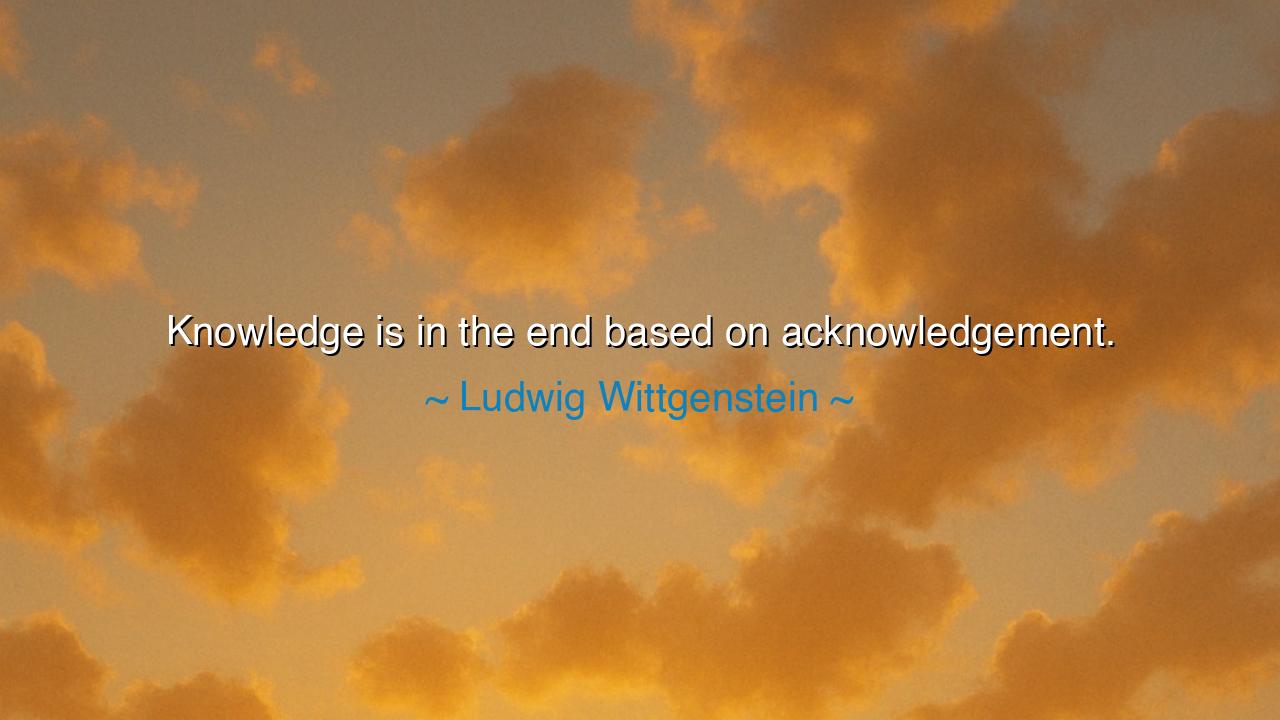
Knowledge is in the end based on acknowledgement.






“Knowledge is in the end based on acknowledgement.” — Ludwig Wittgenstein
In this subtle yet profound statement, Ludwig Wittgenstein, the philosopher of language and truth, unveils one of the deepest mysteries of the human mind — that knowledge, in its purest form, is not merely the possession of facts, but the recognition of truth. His words remind us that the foundation of all understanding rests upon acknowledgement — the humble acceptance that something is so. Before we can know, we must admit. Before we can grasp, we must bow to what is real. Thus, in a world obsessed with proving and mastering, Wittgenstein calls us back to the forgotten art of seeing and accepting.
The origin of this thought lies in Wittgenstein’s lifelong quest to understand how humans make meaning through language. He saw that knowledge was not a tower of logic alone, but a living relationship between minds. To “know” something, he said, is to acknowledge it within a shared framework of understanding — to affirm its place in the great web of human agreement. Even the simplest statement — “the sun rises” — is not knowledge by itself; it becomes knowledge when others recognize and affirm it, when it enters the collective consciousness of humanity. Thus, knowledge is not isolated, but communal; it is born in acknowledgement, sustained by dialogue, and refined through mutual understanding.
This truth shines clearly in the life of Galileo Galilei, the great astronomer who gazed through his telescope and beheld the moons of Jupiter. His knowledge was real, his discoveries true — yet for a time, the world refused to acknowledge them. The truth existed, but it was not accepted. It was only after generations of struggle that Galileo’s revelations became part of the human story of understanding. Here lies the essence of Wittgenstein’s insight: knowledge requires not only discovery but recognition. It is not complete until it is acknowledged, for truth that is denied remains powerless, like a seed buried in unyielding ground.
This idea humbles the proud and empowers the wise. For it teaches that knowledge is not conquest, but communion. To know something deeply — a person, a law of nature, or a spiritual truth — one must acknowledge it fully, not as one who dominates, but as one who listens. The scientist acknowledges the laws of the universe; the artist acknowledges the voice of beauty; the philosopher acknowledges the limits of his own mind. In this way, acknowledgement becomes both the birth and the boundary of knowledge. Those who refuse to acknowledge — who cling to denial, arrogance, or blindness — may collect information, but they will never truly know.
Yet Wittgenstein’s words reach beyond science and philosophy into the very fabric of human relationships. To understand another soul is also an act of acknowledgement. When we see another person — truly see them — in their pain, their joy, their complexity, we come closer to wisdom. A teacher cannot teach until the student acknowledges the lesson; peace cannot exist until enemies acknowledge one another’s humanity. In every realm, from the intimate to the infinite, knowledge begins when we accept what is before us, without distortion or denial.
The acknowledgement Wittgenstein speaks of, then, is not passive; it is a moral act. It demands humility, courage, and clarity. To acknowledge truth often means to confront what we wish were not true — our errors, our ignorance, our mortality. It is to say, “Yes, this is real, and I will face it.” In this sense, every advance in knowledge begins with the quiet strength to stop pretending. The first step to healing is to acknowledge the wound; the first step to wisdom is to acknowledge our limits. Thus, acknowledgement is not the end of inquiry, but its true beginning.
Therefore, dear seeker, take this lesson into your heart: cultivate the virtue of acknowledgement. When you learn, do not merely absorb — recognize. When you speak, do not merely assert — affirm what is true, even when it humbles you. When you encounter another being, see them not as an object to analyze, but as a soul to understand. For all the knowledge of the world will crumble without the foundation of this simple act. To acknowledge is to awaken; to deny is to remain asleep.
And so, remember Wittgenstein’s eternal insight: “Knowledge is in the end based on acknowledgement.” For wisdom is not found in the endless gathering of data, but in the deep and reverent recognition of truth — within ourselves, within others, and within the world that holds us all. The path to knowing begins not in conquest, but in consent — in the stillness of the mind that dares to see, to accept, and to say, with awe and humility, “Yes, it is so.”






AAdministratorAdministrator
Welcome, honored guests. Please leave a comment, we will respond soon